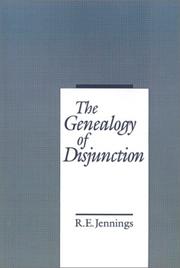| Listing 1 - 1 of 1 |
Sort by
|

ISBN: 0195075242 0199852979 0195360559 1280442409 1423764749 Year: 1994 Publisher: Oxford Oxford university press
Abstract | Keywords | Export | Availability | Bookmark
 Loading...
Loading...Choose an application
- Reference Manager
- EndNote
- RefWorks (Direct export to RefWorks)
This is a comprehensive study of the English word or, and the logical operators variously proposed to present its meaning. Although there are indisputably disjunctive uses of or in English, it is a mistake to suppose that logical disjunction represents its core meaning. Or is descended from the Anglo-Saxon word meaning second, a form which survives in such expressions as "every other day." Its disjunctive uses arise through metalinguistic applications of an intermediate adverbial meaning which is conjunctive rather than disjunctive in character. These conjunctive uses have puzzled philosophers and logicians, and have been discussed extensively under such headings as "free choice permission." This study examines the textbook myths that have clouded our understanding of how or and other "logical" vocabulary comes to have something approaching its logical meaning in natural languages. It considers the various historical conceptions of disjunction and its place in logic from the Stoics to the present day.
Disjonction (Logic) --- Disjonction (Logique) --- Disjunctie (Logica) --- Or (Engels woord) --- Or (Mot anglais) --- Or (The English word) --- Disjunction (Logic) --- English language --- Disjunctive propositions --- Proposition (Logic) --- Etymology --- Disjunction (Logic). --- Or (The English word).
| Listing 1 - 1 of 1 |
Sort by
|

 Search
Search Feedback
Feedback About UniCat
About UniCat  Help
Help News
News